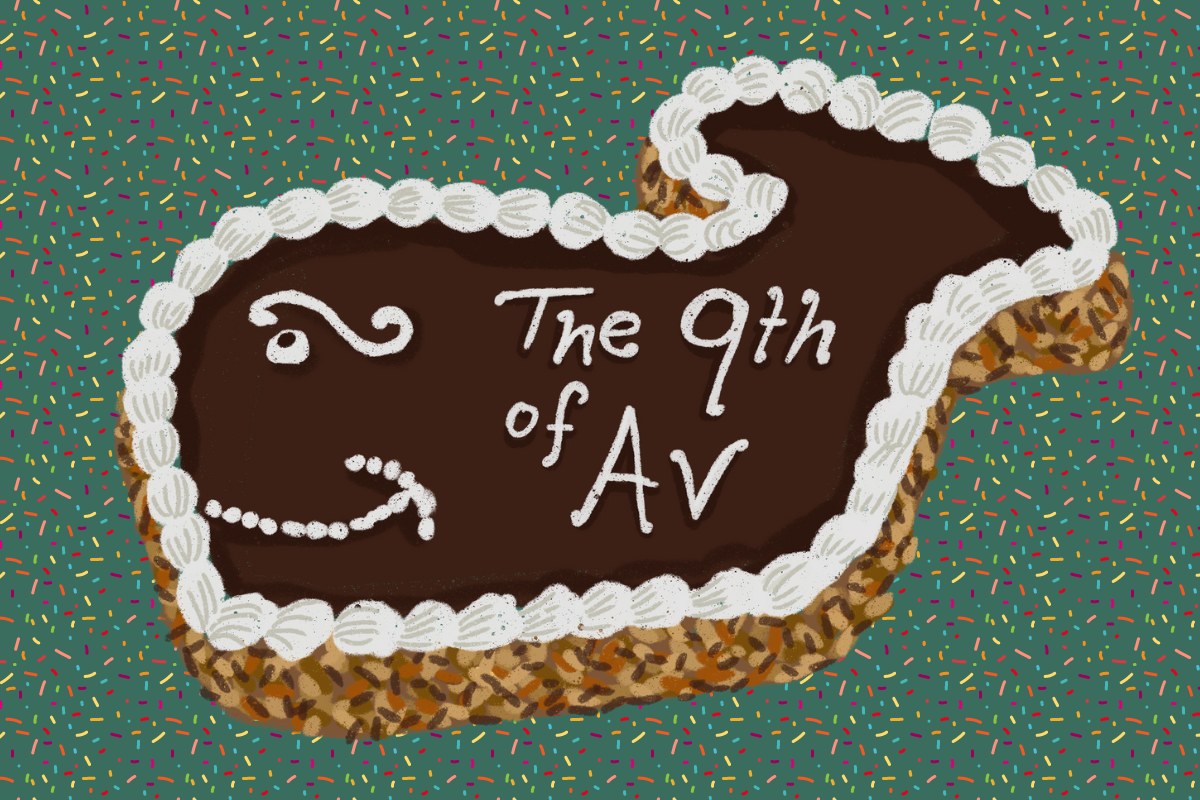Back in high school, I wrangled a group of classmates into a birthday surprise for a close friend of mine. We drove to a couple of stores, found an ice cream cake, brought it home, took it to school the next day, snuck it into a fridge, snuck it past him into the dining room, surprised him and excitedly sang happy birthday. Then he said, “Thanks. I don’t like ice cream cake.”
Some years later, in the weeks before my wedding, I had a chance to spend a weekend away. I asked the same friend if I could spend Shabbat with his family and, on the way over, stopped by Carvel and asked if anybody wanted a pre-Shabbat treat. He had recently changed his opinion on the thing and said, “Why don’t you get an ice cream cake?” I picked up a Fudgie the Whale and we ate it the next day — which was the 9th of Av.
Av is the 11th month in the Jewish calendar, a month so tragic in Jewish tradition that it’s often called Menachem Av, Av of (hopeful) comfort. The 9th of Av is commemorated as the most tragic day of the Jewish year, on which both the first and second Holy Temple burned, the Israelites in the desert were condemned to wander for 40 years and over 100,000 Jews in the city of Beitar were massacred — among many other tragedies. The 9th of Av, also usually known as Tisha B’Av, is a day of mourning, fasting and self-abnegation. Jews don’t greet each other or learn Torah. It’s a tragic, terrible day. With one exception.
On years when the 9th of Av falls out on a Saturday, Tisha B’Av is observed a day later, on the tenth. And on Shabbat, on the 9th, we can say hello, we can eat, we can learn Torah and sing songs, we can live a life of gladness and merriment, and we can have our ice cream cake and eat it, too. Then, at nightfall of Saturday night, we remove our leather shoes, grab our special book of Tisha B’Av elegies (or kinnot) and begin to mourn.
When I bought an ice cream cake for my friend and his family, I decided we’d eat it as dessert for the last meal before nightfall. Emblazoned in white frosting on a fudge-y background, it read, “Have an easy fast!”
Technicalities and loopholes are big parts of practicing Jewish law, but they’re not the reason I eat ice cream cake on the 9th of Av. Yes, it’s fun to say it as if I’m admitting to flouting the traditions of Judaism’s most tragic day, but there’s more to it than that.
After one of the most tragic events in Jewish history, the burning of the Holy Temple, the Talmud tells us that Rabbi Akiva and some sages walked past the site of the destruction. There, they saw a fox climb out of the spot where the Holy of Holies had once stood — a place that was only entered by one person on one day a year, and at all other times was considered too holy to be witnessed by human eyes. And there was a fox, desecrating it.
The sages who saw this wept bitter tears. But when Rabbi Akiva saw the fox, he laughed. They asked him, “Why are you laughing?” And Rabbi Akiva responded that there were two co-dependent prophecies by the prophets Uriah and Zechariah.
Uriah had said that Zion, another name for Jerusalem, would be plowed like a field. Zechariah had foreseen the return of the Jews and their elderly to the streets of Jerusalem. And now that the first had come true, Rabbi Akiva said, of course the second would, too!
Laughter and jokes can be a sign of hope. For millennia, the Jews have suffered, and they’ve also made their jokes. Sometimes, it seems you can’t have one without the other. And Rabbi Akiva expressed his hopefulness with a joke.
Some Jewish communities have a very interesting Tisha B’Av practice that has nothing to do with ice cream cake. They don’t buy the fancy kinnot books with leather covers and commentaries — they get the cheap, paper booklets instead. The reason is because they hope they’ll never have to use them. If the Messiah came and the Holy Temple were rebuilt, there would be no need to mourn and no need for Tisha B’Av.
Rabbi Mordechai Lightstone, director of Tech Tribe, told me that his version of the temporary booklet is downloading the kinnot on his phone if he needs them and deleting them when he’s done.
There’s a hopefulness — or at least there can be — when approaching Tisha B’Av that maybe this year will be different. Maybe instead of mourning, we’ll have something worth celebrating. Maybe we’ll have less to fear, less to regret, less to wish we could escape from. And on years when the 9th of Av falls out on Shabbat, we get a stay of execution, one more day for a chance at a better world.
So, I make my jokes. I get my cake. I eat ice cream cake on the 9th of Av because I can. And I eat ice cream cake on the 9th of Av because I hope one day I can do so even when it’s on a Tuesday.



